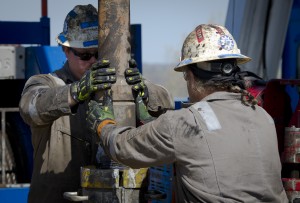Last week on KQED’s Forum program, Al Gore spoke with host Michael Krasny about his new book and a bunch of other topics. One subject that perked our interest because we’ve been covering it: fracking. As KQED Science’s Lauren Sommer explains …
Fracking is an oil-extraction technique in which millions of gallons of water, mixed with sand and chemicals, are injected underground at high pressure. That cracks the rocks, letting the oil out. Around the country, hydraulic fracturing has led to record levels of oil and gas production.
And as Forum’s Amanda Stupi recently wrote in her post “What to Pay Attention to as the California Fracking Debate Heats Up” …
While fracking has been big news for a while in Pennsylvania, North Dakota and elsewhere in the country, it has yet to become a popular topic of dinner conversation in California. That’s likely going to change.

Why? Because the federal Bureau of Land Management has opened up 18,000 acres in Monterey, Fresno and San Benito Counties to oil leases. But the oil deep in what’s called the Monterey Shale is notoriously tough to extract. “Most if it is locked inside the shale rock,” Lauren Sommer reports. “But recently, oil companies have gotten a lot better at getting oil out of shale thanks to hydraulic fracturing.”
California’s Division of Oil, Gas and Geothermal Resources (DOGGR) is now drafting regulations around fracking. But many environmentalists are just dead-set against the technique, worrying about water contamination and other negative effects. So let’s hear what former Vice President Al Gore — one of the world’s most influential advocates on climate change and other environmental issues — has to say.
Forum host Michael Krasny: What do you think about the anticipated fracking expansion in California?
Al Gore: I’m concerned about it. It has pluses and minuses. Advocates have long pointed out that natural gas has only 50 percent of the CO2 content when it’s burned compared to coal. But a lot of it leaks in the fracking process. And when the methane leaks into the atmosphere, each molecule has 70 times the potential warming effect compared to CO2 over a 10-20 year period, and then it lessens somewhat. But that means not very much needs to leak to wipe out the advantage.
And then there are the water requirements. Six million gallons on average for each new fracking well. And the water that’s used is mixed with very toxic chemicals, and that sometimes pollutes the groundwater. The industry claims it doesn’t, but there are too many examples that shows that it does — often when they re-inject the poisoned fracking water back deep into the earth.
These and other issues are ones that I think are deserving of careful exploration.
People often say fracking is an issue that requires the classic question: is the glass half-full or half-empty?
Well, the Earth’s atmosphere is completely full. And we’re going to have to make a shift to renewable energy sources. We have the ability to do that. The report came out recently that last year the largest new additions to electricity production in the U.S. came from wind — 42 percent of all new energy production from wind. In Australia, wind energy, a report says, is now cheaper than electricity from a new coal plant or a new gas plant. And solar photovoltaic energy is spreading far more rapidly than anyone thought was possible. In 2010 the world’s cumulative investments in renewable energy for the first time exceeded the world’s investments in fossil fuel energy.
Now the fracking wave over the last two years has put [non-renewables] out in front again, but it is inexorable that we will shift to renewable energy. Part of the problem with speeding up this transition, though, is that we provide massive subsidies to coal and oil, and on a global basis it amounts to about $500 billion a year. We ought to save money buy stopping those subsidies to the dirty carbon fuels.
I asked Lauren Sommer to comment on one part of what Gore said: his contention that there have been “too many examples” of groundwater being contaminated by the fracking process.